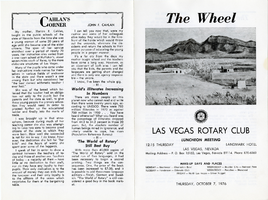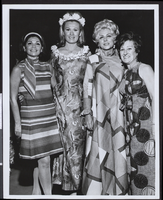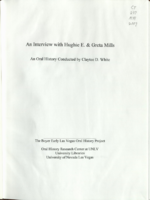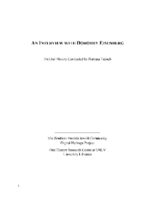Search the Special Collections and Archives Portal
Search Results

The Wheel Las Vegas Rotary Club newsletter, October 7, 1976
Date
Archival Collection
Description
Text

Scrapbook pages from the Las Vegas Chapter of Hadassah, 1968-1969
Date
Archival Collection
Description
This folder contains loose scrapbook pages documenting the years 1968 and 1969 for the Las Vegas Chapter of Hadassah. The pages hold photographs, pamphlets, invitations, newspaper clippings and other ephemera about the active chapter.
Mixed Content

Transcript of interview with Vincent Kethen by Claytee White, December 23, 2009
Date
Archival Collection
Description
In 1964, the year that Vincent Kethen was born, desegregation of Las Vegas schools began. Like many African-American children living in the Las Vegas Westside neighborhood, Vincent was bused out of his neighborhood in third grade to attend a white school. In his case, this meant attending John S. Park Elementary and later other predominantly white schools. He talks about these experiences. John S. Park was a neighborhood of manicured lawns, while the school bus and the classroom were places fraught with fisticuffs. The experience of growing up during that era are recalled. Vincent provides a sense of that it was like to reside in his home neighborhood and the onslaught of the drug culture altered gang-lead neighborhoods. Being bused had positive results he explains, such as athletics, which served as an equalizer. For Vincent, a solid upbringing, which included love of church and the chance to attend college, encouraged him to make good decisions about his future. He received a four-year degree and he returned to Las Vegas to "give back." For over a decade and a half, her has coached young basketball players and helped them see their options for a brighter future than they might otherwise have seen.
Text
Evelyn Stuckey Papers
Identifier
Abstract
The Evelyn Stuckey Papers date from 1940 to 1972 and document Stuckey's experience as a physical education teacher at Las Vegas High School (LVHS) in Las Vegas, Nevada and founder of the LVHS Rhythmettes dance group. The collection contains personal and educational materials from Stuckey’s college years, personal correspondence, and photographs. It also contains materials documenting the Rhythmettes' activities including travel plans, posters and fliers, news clippings, and group rosters.
Archival Collection

Transcript of interview with Hughie and Greta Mills by Claytee White, April 7, 2011
Date
Archival Collection
Description
Hughie and Greta Mills spent their childhoods in Charlestown, West Virginia. Fate would bring them together years later in New York City. They married in 1954. Both Hughie and Greta talk about achieving a better life through education and perseverance. He became an educator and she a librarian. In 1989, the couple relocated to Las Vegas, seeing the weather and retirement lifestyle here to their liking. During this interview they describe their lives, individually and as a couple, and how they embraced life and living in Las Vegas as a retired, African- American couple.
Text

Transcript of interview with Dorothy Eisenberg by Barbara Tabach, October 23, 2014
Date
Archival Collection
Description
Interview with Dorothy Eisenberg by Barbara Tabach on October 23, 2014. In this interview, Eisenberg discusses her upbringing on the east coast and becoming a widow with four children. She met her second husband at a synagogue, and they moved to Las Vegas for a fresh start. Eisenberg became involved with Temple Beth Sholom, and the Las Vegas League of Women Voters. She has a school named after her in the Clark County School District.
Dorothy Eisenberg is a first generation American, with roots in Ukraine and Central Europe, and grew up in Philadelphia. Judaism was a significant part of Dorothy's life from the beginning, and both her and her brother spent many of their afternoons at Hebrew school and most weekends at Shabbat services as adolescents. Eisenberg moved to Las Vegas with her children and second husband in 1964. She became an influential member of the community and served as the Jewish Federation of Las Vegas's first female president. She was also actively involved in the League of Women Voters of Las Vegas Valley, including leading the organization's advocacy for school desegregation and serving as its president for two years.
Text

Transcript of interview with Bud Weil by Claytee White, December 9, 2003
Date
Archival Collection
Description
Bud Weil worked as a disc jockey in Mexico after serving in the military during World War II. In 1947, he moved to Las Vegas to work at KLAS but after two days he was job hunting. His search landed him at KENO, a radio station owned by Max and Laura Belle Kelch. His was an interview show that afforded him entree to stars performing in town. The list of his favorite interviews includes Sophie Tucker, Sammy Davis, Jack Benny, The Mills Brother, Rosemary Clooney, Leno Home, Joey Lewis and many others. In 1955, he became restless, left the career in broadcasting, and joined Max Kelch as a partner in a new venture for Las Vegas - Musak. This enterprise took him to the doors of every business in town and shortly, he knew everybody. He uses that knowledge in this interview to talk about all aspects of life as the town grew over the years. Today he is a senior statesman of our town, enjoying everything about Las Vegas except the traffic.
Text
Thalia Dondero Political Papers
Identifier
Abstract
The Thalia Dondero Political Papers (1934-2003), contain correspondence, pamphlets and reports used by Dondero to conduct official business, as well as information on county and city budgets, social and health services, liquor and gaming, planning, public works, environmental impact reports and a large section on water management. Dondero served as a Clark County Commissioner for twenty years and engaged in numerous other civic and political activities. The bulk of the materials are derived from Dondero's last four years in office, 1990-1994, but a few items from Dondero's earlier career are included.
Archival Collection


